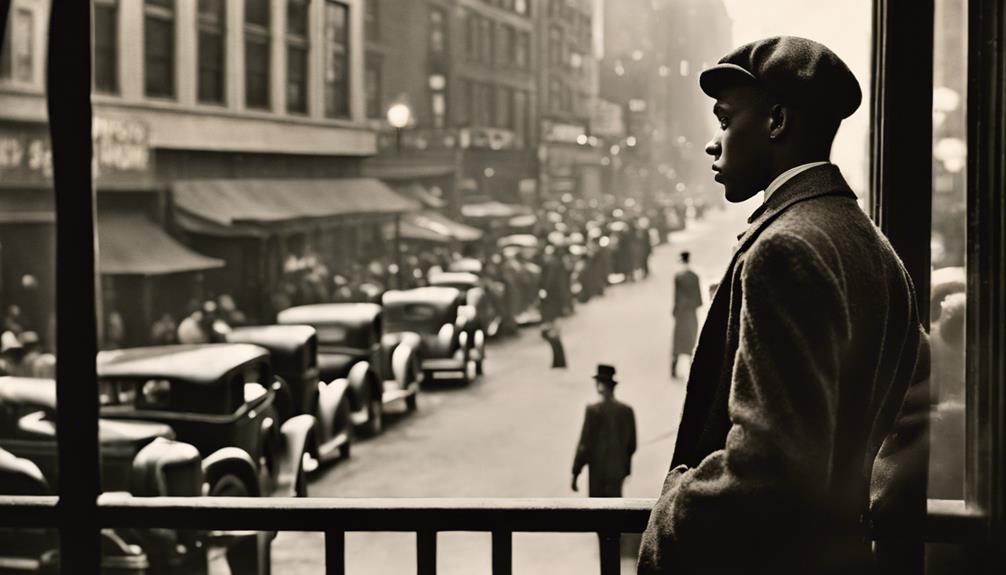Explore the profound impact of Richard Wright's works celebrating social justice, racial equality, and the Black experience in America and beyond. From his upbringing on a plantation to his powerful novel 'Native Son,' Wright fearlessly tackled racism and poverty. His literary activism and unwavering commitment to equality continue to inspire generations worldwide. Commemorative events like the Paris tribute and international recognition showcase his enduring influence. Invisible Paris tours, founded by Professor Michel Fabre, uncover hidden Black history sites in the city. Discover more about Richard Wright's legacy and influence on societal change.
Early Life and Education
Richard Wright's early life and education laid the groundwork for his groundbreaking literary contributions. Born in 1908 on the Rucker plantation, Wright faced the harsh realities of poverty and segregation with a sharecropper father and teacher mother.
Despite these challenges, he excelled academically, graduating as valedictorian from Smith Robertson Junior High School. The struggles of his upbringing in the racially charged South deeply influenced his worldview.
In 1927, Wright's journey led him to Chicago, where the city's cultural vibrancy ignited his passion for writing. Chicago provided the backdrop for his early career, where he fearlessly explored themes of racism and inequality.
Wright's formative years and education not only shaped his perspective on social issues but also served as the bedrock for his impactful literary legacy. The experiences and lessons learned during his early life would go on to shape the powerful narratives that define his work.
Writing Journey
During his writing journey in Chicago, you plumbed the harsh realities of racism and inequality into your powerful literary works. The city's vibrant yet segregated streets fueled your creativity, inspiring pieces like 'Native Son.' In this novel, published in 1940, you explored the struggles of Black Americans through the eyes of the protagonist, Bigger Thomas.
'Native Son' became a poignant symbol of the injustices faced by many, propelling you into the literary spotlight.
Your experiences in Chicago shaped not only 'Native Son' but also your later works, including the impactful autobiography 'Black Boy' released in 1945. Through your writing, you fearlessly addressed social issues in novels like 'The Outsider' and 'The Long Dream,' challenging societal norms and advocating for equality.
As you continued your writing journey beyond Chicago, your voice remained unwavering in the face of racial struggles, leaving an enduring legacy that transcends borders and generations.
Breakthrough With Native Son

You'll explore how 'Native Son' marked a turning point in Richard Wright's career, shedding light on the struggles faced by Black Americans through the character of Bigger Thomas.
This novel not only propelled Wright to international literary fame but also solidified his reputation as a powerful voice for equality and social justice.
The impact of 'Native Son' reverberated beyond its initial publication, cementing Wright's legacy as a prominent advocate for change.
Bigger Thomas Symbolism
Symbolizing the harsh realities of racism and poverty, Bigger Thomas serves as a poignant figure in Richard Wright's 'Native Son.' Bigger Thomas, the protagonist created by Wright, represents the struggles and hardships faced by Black Americans in a racially divided society.
Through Bigger Thomas's character, Wright explores the dehumanizing impacts of racism and poverty prevalent in 1930s Chicago. By portraying Bigger Thomas's psychological journey, Wright sheds light on the profound effects of systemic oppression on individuals, offering a stark commentary on the racial injustices of the time.
Wright's portrayal of Bigger Thomas in 'Native Son' not only garnered critical acclaim but also propelled him to international literary fame. The character of Bigger Thomas endures as a powerful symbol of the ongoing battle against racial inequality and social injustices within American literature.
Bigger Thomas's significance lies in his ability to embody the collective struggles of marginalized communities, making him a timeless and impactful figure in Wright's body of work.
International Literary Fame
Achieving international literary acclaim with the groundbreaking novel 'Native Son' in 1940, Richard Wright's portrayal of Bigger Thomas catapulted him into the global spotlight, sparking pivotal conversations on race and inequality.
As an African American writer, Wright's work transcended borders, resonating with audiences worldwide and garnering widespread international recognition. Through the character of Bigger Thomas, Wright shed light on the systemic challenges faced by Black Americans, provoking deep reflections on racism and social injustice on a global scale.
'Native Son' not only propelled Wright to literary stardom but also solidified his reputation as a powerful voice advocating for social change. The novel's themes of race relations and inequality struck a chord with readers from diverse backgrounds, leading to translations of Wright's work into numerous languages.
Legacy as an Activist
Richard Wright's heritage as an activist remains a powerful demonstration of his unwavering commitment to social justice and equality. Through works like 'The Outsider' and 'The Long Dream,' he fearlessly addressed racial struggles and inequality, shedding light on societal injustices.
Wright's decision to move to Europe in the 1950s, partly driven by a desire to escape racial tensions in the US, didn't diminish his activism. Even from afar, his literary activism continued to challenge social norms, leaving a profound impact on the fight for equality.
Despite his passing in 1960, Richard Wright's heritage as an activist and writer endures, inspiring generations to advocate for a fairer society. His storytelling remains a beacon for those fighting against discrimination, standing as a tribute to the enduring power of literature in sparking social change.
Remembering Wright in Mississippi

As you explore Richard Wright's impact on Mississippi, you'll find his childhood home in Natchez, now a significant literary landmark that draws visitors from far and wide.
The state's recognition of Wright's contributions is evident through events like Richard Wright Week, first designated by Governor Bill Allain in 1985.
Mississippi continues to honor Wright's legacy by celebrating his literary achievements and ensuring his place in the state's cultural history remains prominent.
Mississippi Literary Landmark
Mississippi's Literary Landmark status commemorates Richard Wright's profound influence on literature within his home state. The recognition of his impact is evident through various initiatives dedicated to preserving and celebrating his legacy in Mississippi:
- Governor Bill Allain designated the first Richard Wright Week in Mississippi in 1985, marked by a symposium held at the University of Mississippi.
- Richard Wright's childhood home in Natchez stands as a historic landmark today, serving as a tribute to his roots and literary contributions.
- Since 2020, Richard Wright has been included on the Mississippi Writers Trail, acknowledging his significant role in shaping the state's literary landscape.
- Mississippi honors writers with the Richard Wright Literary Excellence Award, emphasizing the enduring influence of Wright's work on future generations of Mississippi writers.
These efforts underscore Mississippi's commitment to ensuring that Richard Wright's profound impact on American literature isn't forgotten but rather cherished and perpetuated for years to come.
Richard Wright Week
Designated by Governor Bill Allain in 1985, the inaugural Richard Wright Week in Mississippi showcased the lasting impact of the renowned author's literary legacy. The week-long celebration aimed to honor Wright's contributions to literature and his influence on Mississippi's cultural heritage.
A symposium held at the University of Mississippi brought together scholars, writers, and readers to commemorate Wright's work and discuss its significance. Richard Wright's childhood home in Natchez, now a designated historic landmark in Mississippi, serves as a tangible reminder of his roots in the state.
Furthermore, since 2020, Richard Wright has been rightfully included on the Mississippi Writers Trail, recognizing his profound impact on the literary landscape of Mississippi. This inclusion not only pays tribute to Wright's literary achievements but also ensures that future generations continue to remember and appreciate his groundbreaking work.
Additionally, the Richard Wright Literary Excellence Award, established to honor outstanding Mississippi writers who embody Wright's literary spirit, further cements his legacy in the state's literary community.
Richard Wright Tribute and Legacy
Celebrating Richard Wright's enduring legacy involves recognizing his impact on literature and society through influential works like 'Black Boy' and 'Native Son'. His contributions continue to resonate globally, shaping conversations on race, identity, and social justice.
Here's why Richard Wright's tribute and legacy are significant:
- Paris Commemoration: Wright's legacy is honored in Paris on the 50th anniversary of his passing, with a tribute collage at Père Lachaise cemetery, showcasing his lasting influence in the city where he resided.
- Literary Impact: His significance as an author is underscored through his powerful narratives, particularly 'Black Boy', which vividly captures the struggles and resilience of Black Americans in the Jim Crow South.
- Activism and Influence: Wright's life in Paris, where he became a French citizen, not only influenced his writing but also fueled his activism, leaving an indelible mark on both literature and social justice movements.
- Global Recognition: The celebration of Richard Wright's literary contributions extends beyond borders, emphasizing his enduring influence on writing and advocacy for equality worldwide.
Invisible Paris Tours and Walks

Discover the hidden treasures of Paris through the engrossing and informative Invisible Paris Tours and Walks. Founded after a class with Professor Michel Fabre, these tours incorporate Black history into the vibrant tapestry of Paris.
Available on smartphones, Invisible Paris Walks explore sites like Père Lachaise and the Colombarium, offering a unique perspective on the city's lesser-known corners.
Invisible Paris also extends its reach through the Invisible Paris book, encouraging readers to seek out overlooked parts of the city and order the Invisible Paris Walks book for a more immersive experience.
Contributors to Invisible Paris share fascinating stories about renowned figures such as Pierre Curie and the Eiffel Tower architect, unraveling the layers of history that make Paris so enchanting.
From weekend events to exploring hidden places like Jean Veber's house, Invisible Paris content promises a deeper understanding of the city's rich heritage, making it a must for anyone intrigued by the intersection of culture and history, especially Black Americans like Richard Wright.
Richard Wright's Literary Legacy
Richard Wright's literary legacy, rooted in powerful narratives of Black American experiences, continues to shape discourse on race and social justice. His impact on American literature and activism is profound, with his works like 'Native Son' and 'Black Boy' serving as cornerstones in the portrayal of the Black man's struggles in a racially divided society.
Here are four key points highlighting Richard Wright's lasting literary legacy:
- Social Relevance: Wright's exploration of themes such as racism, poverty, and social injustice resonates globally, challenging societal norms and advocating for equality through compelling storytelling.
- Impact on Discussions: His works have been pivotal in shaping discussions on race relations and inequality, pushing boundaries and fostering dialogue on critical societal issues.
- Symbol of Resilience: Beyond his literary contributions, Wright stands as a symbol of resilience and courage, inspiring future generations of writers and activists to speak out against oppression.
- Enduring Influence: The enduring relevance of Wright's works is evident in the ongoing scholarly publications, commemorative events, and international celebrations dedicated to honoring his profound contributions to American literature and social justice.
International Recognition and Commemorative Events

International recognition and commemorative events have solidified Richard Wright's status as a literary icon whose influence transcends borders.
The first international conference on Richard Wright, held in the US, underscored the global engagement with his works.
In 2008, centennial celebrations were organized worldwide, shining a light on Wright's enduring literary impact.
Symposia, screenings, and newsletters have facilitated international dialogue on Wright's contributions to literature and society.
The Richard Wright Circle and the Project on the History of Black Writing have played pivotal roles in promoting scholarly discussions and community engagement with his ideas.
Additionally, a summer institute for teachers sought to deepen understanding of Wright's literature, offering innovative approaches to teaching and appreciating his work.
Through these international efforts, Richard Wright's legacy continues to be honored and celebrated on a global scale, highlighting his profound influence on literature and social discourse.
Conclusion
As you reflect on the legacy of Richard Wright, envision the words of Native Son echoing through the streets of Paris and Mississippi.
Imagine walking in his footsteps, exploring the depths of his literary works and activism.
Let his powerful voice continue to inspire and educate, resonating across borders and generations.
Celebrate the groundbreaking contributions of this literary giant, forever etched in the history of American literature and social justice movements.




